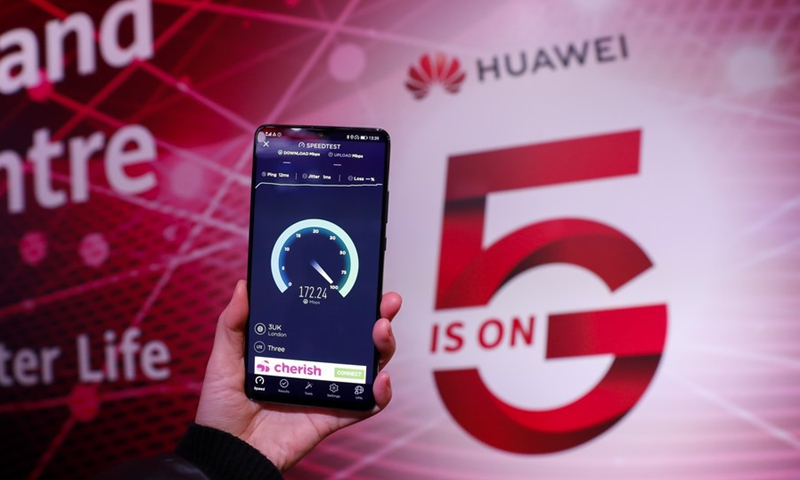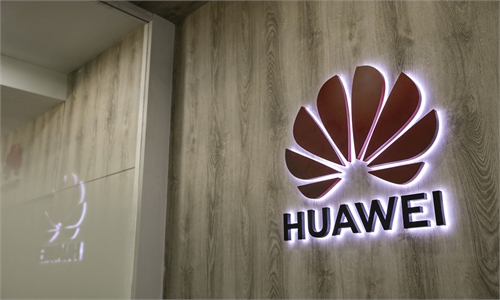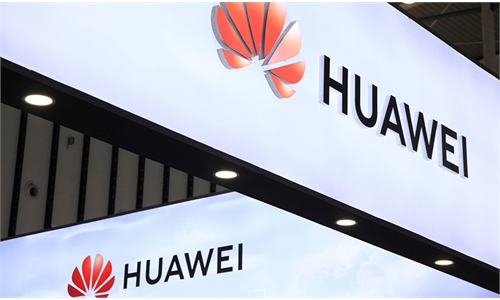Huawei sues FCC over ‘security threat’ labeling
Move aimed at protecting legitimate rights based on US law

Photo taken on Jan. 28 shows a Huawei 5G mobile phone testing speed at the Huawei 5G Innovation and Experience Center in London, Britain. (Photo: Xinhua)
Chinese tech firm Huawei has challenged the US Federal Communications Commission (FCC) for labeling it as a national security threat, a move aimed at protecting its legitimate rights in accordance with the US law and process in response to US' continuous crackdown, said observers.
An attorney for Huawei appealed at US 5th Circuit Court of Appeals claiming the FCC is wrong to label the Chinese tech giant's equipment as a "national security threat" as the commission has no standards to tag it so, according to media reports.
The attorney claimed that the FCC has not yet developed specific criteria for how to identify and weed out security threats, and instead simply identified specific aspects of Huawei's business and then deemed those things threatening, said the report.
Huawei said it has no official response to the lawsuit, but confirmed there was a "procedural session" on Wednesday.
"Huawei's appeal is just another normal lawsuit procedure that aims to protect its legitimate rights," Gao Lingyun, an expert at the Chinese Academy of Social Sciences in Beijing, who closely follows China-US relations, told the Global Times on Thursday.
Although filed during the presidential election, Gao said the timing of the appeal may have no link with the election and might be just based on the requirement of US law.
In December last year, Huawei mounted a legal challenge to the FCC, seeking to overturn an unlawful order passed by the FCC on November 22. The order bans carriers in rural America from tapping the Universal Service Fund (USF) to purchase Huawei equipment.
Not only in the US, Huawei has told top European lawmakers that Warsaw and Bucharest risk violating EU law with new 5G security rules, offering a glimpse into possible court battles over new telecom security policies.
In a letter sent to EU competition chief Margrethe Vestager on September 11, Huawei said the proposed 5G security rules in Poland and Romania "are predicated on several violations of EU law."
The experience of Huawei over the past year offers lessons to many of its Chinese counterparts, who may not be targeted specifically but have been hurt more or less due to the US' initiated trade fight with China.
Nevertheless, most of the Chinese tech firms are taking a calm attitude toward the ongoing US presidential election, as they believe no matter who will take the presidency, their long-term strategy will not alter, and they are prepared to cope with the external uncertainties in the coming days.
US long-term strategy to crack down on high-tech companies will not simply change no matter who will take the presidency, a spokesperson from a leading Chinese drone-maker, who spoke on condition of anonymity, told the Global Times on Thursday.
"But the US policy toolbox has almost bottomed out, with almost no new tricks, it's now more verbal shouts than real practice," said the person, noting that what Chinese technology companies have to do now is to step up research and development, and strive to come up with more powerful countermeasures.
"We only hope to compete in a fair and rule-based business environment no matter who will take office," a person close to a leading Chinese tech giant told the Global Times on Thursday.
Experts also noted that although the confrontation between the world's two largest economies may last for some time, there will never be decoupling, as the cooperation between the two sides is determined by their complimentary economic structure.
Defying calls for a so-called "China-US decoupling" from some US politicians, 196 US businesses are attending the CIIE, including 58 pharmaceutical firms and 40 consumer goods suppliers. The number of US exhibitors is largely in line with last year's 192.
Richard Li, director of technical marketing in US firm Qualcomm, told the Global Times on Thursday that it is still working and connecting closely with Chinese firms, and attaching great importance to China market when developing its products.
The firm has also confirmed that it has applied for a license to continue to supply to Huawei amid US chipset ban.
Shane Tedjarati, president of Honeywell global high growth regions, also confirmed the company's long-term commitment to the China market, noting that the firm will continue developing its core business and investing in emerging segments in the China market.
"Honeywell is actively participating and serving China's sustainable growth development needs, including New Infrastructure and 5G," said Tedjarati.


